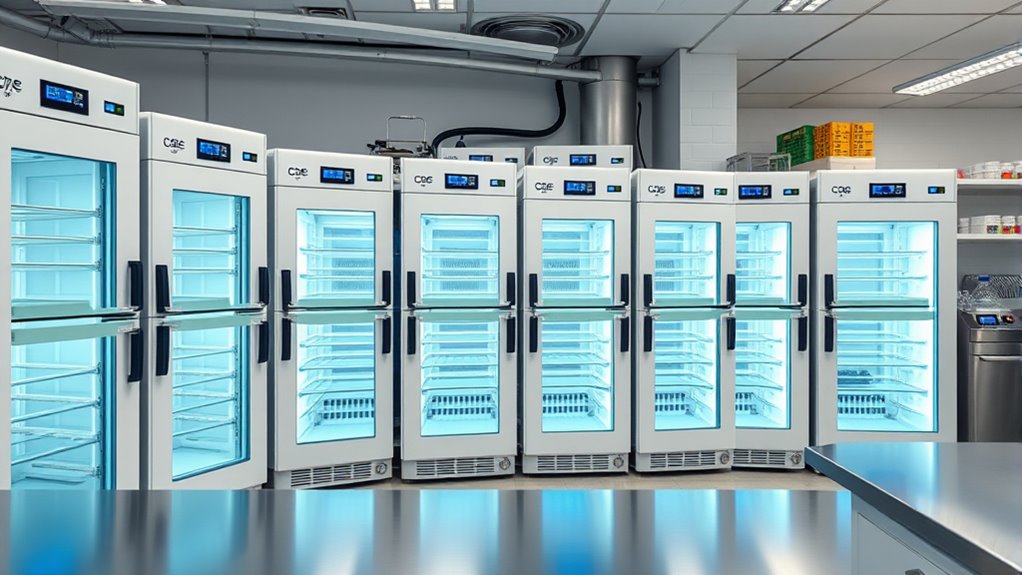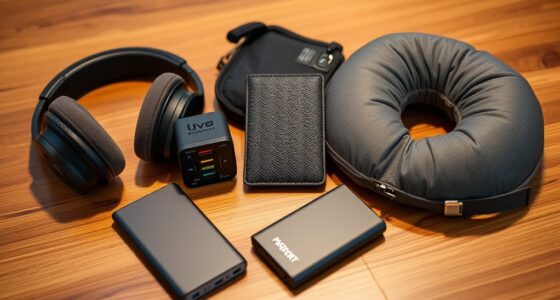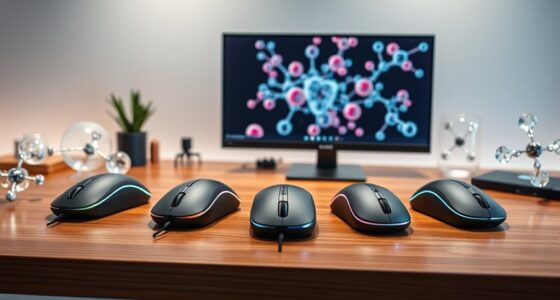If you’re seeking the best high-capacity CO₂ incubators for lab efficiency in 2025, I recommend considering models with advanced climate control, reliable temperature stability, and automatic features like egg turning and humidity regulation. Sizes range from 6L to 180 eggs, suitable for various research and breeding needs. Durability, precise monitoring, and space planning are essential. Keep exploring, and you’ll find top options that balance capacity with precision for your lab’s success.
Key Takeaways
- Prioritize incubators with large capacities (up to 180 eggs or equivalent cell culture spaces) for high-throughput lab needs.
- Choose models with precise temperature, humidity, and CO₂ regulation using advanced PID and microcontroller systems.
- Opt for units featuring digital displays, real-time monitoring, and alarm systems to ensure consistent environmental conditions.
- Consider durable, corrosion-resistant materials and compact designs to optimize space and longevity in busy laboratory environments.
- Select incubators with automatic functions like egg turning and humidity control to improve efficiency and hatch success rates.
HOWOOlUA 56 Egg Incubator with Auto Turn and Climate Control

If you’re looking for a reliable incubator that combines precision control with ease of use, the HOWOOlUA 56 Egg Incubator stands out. It offers fully automatic temperature regulation with a clear Celsius display, ensuring stable conditions. Humidity levels are automatically adjusted, creating ideal environments for incubation. Its smart auto-turn feature rotates eggs every 2 hours, promoting even warmth and proper positioning before hatch. The built-in hatch countdown helps track progress, while the cold-light egg candler allows safe embryo inspection without opening the lid. Designed for versatility, it accommodates various egg sizes and maintains stable airflow, maximizing hatch success rates effortlessly.
Best For: hobbyists, small-scale poultry farmers, or anyone seeking a user-friendly incubator with precise environmental controls for successful hatching.
Pros:
- Fully automatic temperature and humidity regulation for consistent incubation conditions
- Smart auto-turn feature promotes even warmth and proper embryo development
- Built-in hatch countdown and egg candler for easy monitoring without opening the incubator
Cons:
- May require initial calibration and careful setup for optimal performance
- Larger capacity could be bulky for small or space-limited users
- Dependence on electrical power means it may not be suitable for off-grid locations
R-Com MX-20 Digital Egg Incubator

The R-Com MX-20 Digital Egg Incubator stands out for its fully automatic functions, making it an excellent choice for breeders seeking reliable and precise hatch rates. It holds up to 20 chicken eggs, with adjustable trays to accommodate quail, goose, or other eggs. The digital display ensures accurate temperature and humidity control, while the auto turner and egg dividers simplify operation. It maintains stable conditions regardless of ambient changes and recovers humidity quickly after lid openings. Praised for high hatch success and ease of use, it’s ideal for both beginners and experienced breeders aiming for consistent results across various bird species.
Best For: breeders and hobbyists seeking a reliable, easy-to-use incubator capable of hatching a variety of bird species with high success rates.
Pros:
- Fully automatic with digital temperature and humidity control for precise monitoring
- Versatile tray adjustments to accommodate different egg sizes and types
- Quick humidity recovery and stable conditions regardless of ambient changes
Cons:
- Potential vibration issues affecting some eggs, which may impact hatch rates
- Seller policies on delivery requiring signatures and difficult pickup can be inconvenient
- Slight variation in temperature accuracy between units; regular calibration recommended
MATICOOPX 30 Egg Incubator with Humidity Display

The MATICOOPX 30 Egg Incubator with Humidity Display stands out for its reliable temperature control and circulating airflow system, making it ideal for those aiming to optimize hatch rates. Its powerful fan maintains stable temperatures, vital for successful incubation. The external water refill feature ensures consistent humidity without opening the lid, preventing temperature drops. A built-in egg candler allows easy embryo monitoring without additional equipment. The incubator automatically turns eggs side-to-side every 60 minutes, with an auto-stop feature three days before hatching to improve hatch success. Overall, it offers ease of use, precise environment control, and reliable performance.
Best For: hobbyists, small-scale breeders, or anyone seeking a reliable and easy-to-use incubator to improve hatch success rates.
Pros:
- Reliable temperature control with circulating airflow for consistent incubation conditions
- External water refill feature maintains optimal humidity without opening the lid
- Built-in egg candler allows easy embryo monitoring without additional equipment
Cons:
- Limited to 30 eggs, which may not suit large-scale operations
- Automatic egg turning occurs only every 60 minutes, which might not be ideal for all species
- Auto-stop feature is only available three days before hatching, requiring manual oversight for full hatch cycle
MATICOOPX 20 Egg Incubator with Humidity Display
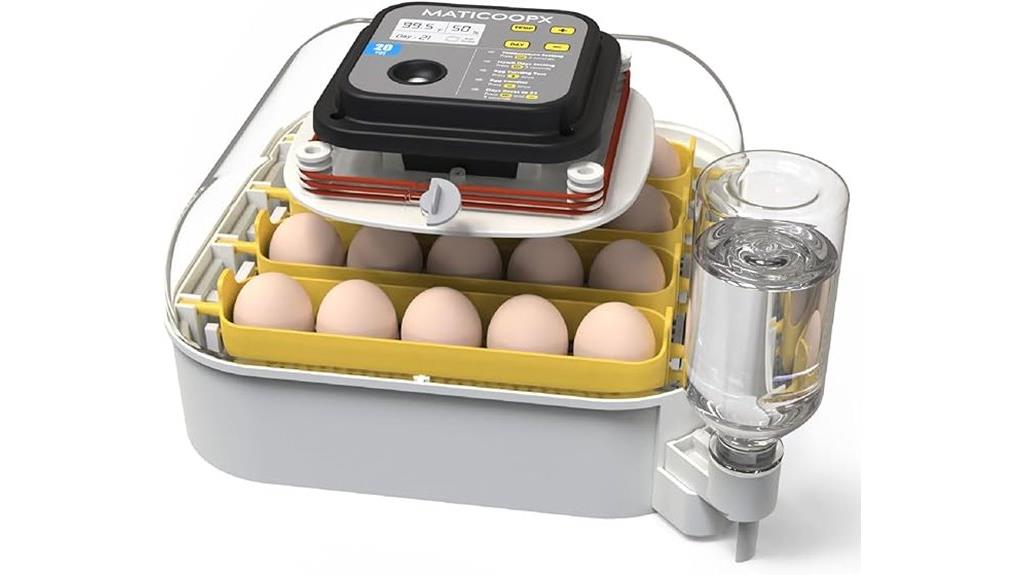
Designed for small-scale hatchers and hobbyists, the MATICOOPX 20 Egg Incubator with Humidity Display offers precise temperature and humidity control, ensuring ideal conditions for embryo development. Its circulating airflow maintains consistent warmth, while the external water refill feature prevents temperature and humidity fluctuations. The automatic egg turner rotates eggs every 60 minutes, stopping three days before hatch to prevent excess turning. An integrated egg candler allows easy embryo observation. Made of durable plastic and weighing just 6.8 pounds, this compact incubator is user-friendly, reliable, and highly rated, making it a great choice for those seeking efficient, small-scale incubation.
Best For: small-scale hatchers, hobbyists, and poultry enthusiasts seeking reliable and easy-to-use incubation solutions.
Pros:
- Precise temperature and humidity control for optimal embryo development
- Built-in egg candler for convenient observation without additional equipment
- Automatic egg turner ensures uniform incubation and stops three days before hatch
Cons:
- Limited capacity of 20 eggs may not suit larger operations
- Made of plastic, which may be less durable than metal options
- Requires external water refilling, which might be less convenient for some users
Vevor Lab Incubator, 6L PID Temperature Control
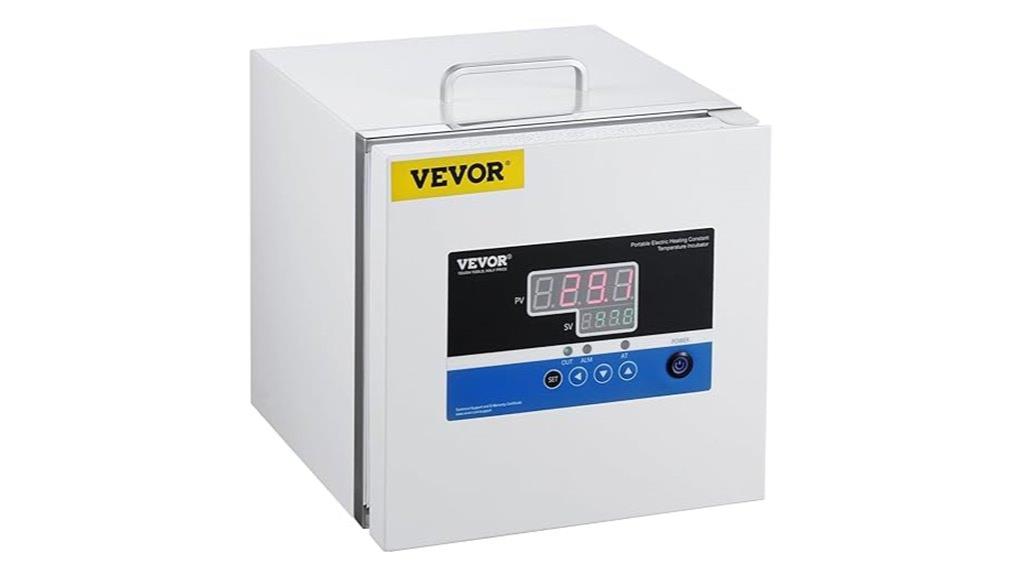
If you’re looking for a compact incubator that offers precise temperature control, the Vevor Lab Incubator with 6L capacity is an excellent choice. It’s portable with a top handle, making it easy to move around your lab. Using advanced PID technology, it maintains temperature within ±2℃ across a range of RT+5℃ to 65℃, ensuring reliable results. The LED digital display makes setting temperatures straightforward. Its thermal convection system guarantees even heat distribution, while the cold-rolled steel exterior and stainless steel interior ensure durability. Widely used in biomedicine and microbiology, it’s a dependable, space-efficient option for various laboratory applications.
Best For: researchers and laboratory professionals needing a compact, precise incubator for biological, microbiological, or plant cultivation tasks.
Pros:
- Precise temperature control with PID technology maintaining ±2℃ accuracy
- Compact and portable design with a top handle for easy mobility
- Durable construction with stainless steel interior and steel exterior for long-term use
Cons:
- User instructions may be unclear, requiring additional guidance
- Some units reported door damage upon unpacking during shipping
- Limited capacity of 6L may not suit larger sample needs
36-60 Egg Incubator with Automatic Egg Turning and Humidity Control
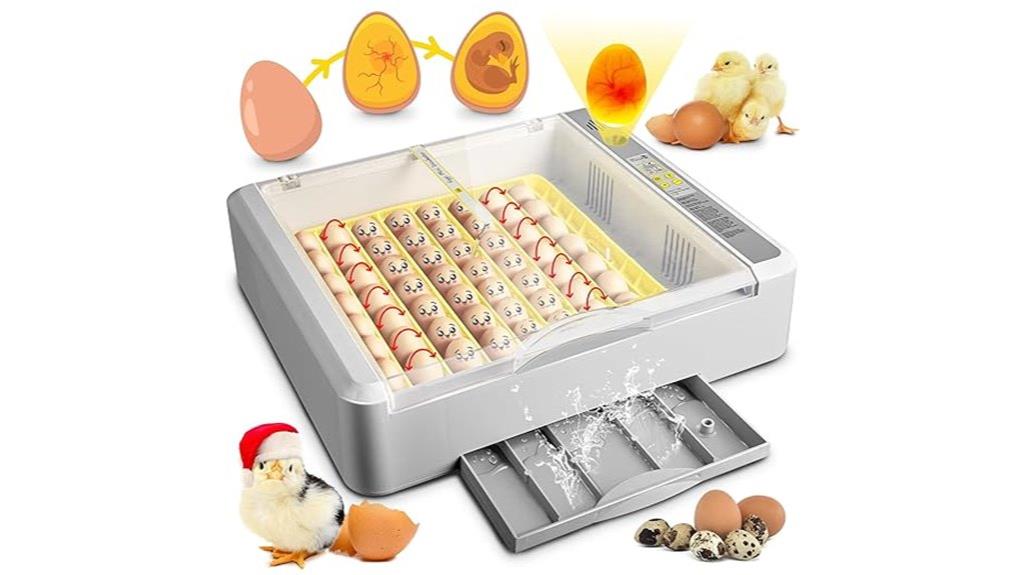
For laboratories seeking reliable incubation with minimal manual intervention, the 60 Egg Incubator with Automatic Egg Turning and Humidity Control stands out. It accommodates chicken, duck, and quail eggs with an adjustable frame and eight sticks for different egg sizes. The incubator automatically turns eggs every two hours, ensuring even development, and continuously records incubation days. Its LCD display shows humidity, temperature, and turning status, while a large water tank maintains ideal humidity levels. Safety features include alarms for temperature or humidity deviations, which can be manually canceled. This incubator combines convenience, precision, and safety, streamlining incubation processes for busy labs.
Best For: laboratories and hobbyists seeking reliable, automated incubation for chicken, duck, and quail eggs with minimal manual intervention.
Pros:
- Automates egg turning every two hours, ensuring even development without manual effort
- LCD display provides real-time monitoring of temperature, humidity, and incubation progress
- Large water tank maintains optimal humidity levels for high hatch success rates
Cons:
- May require initial setup and calibration for precise environmental control
- Larger size and capacity might not be suitable for very small or portable incubation needs
- Dependence on electrical power means operation is affected during power outages without backup systems
IVYX Scientific 25L Incubator
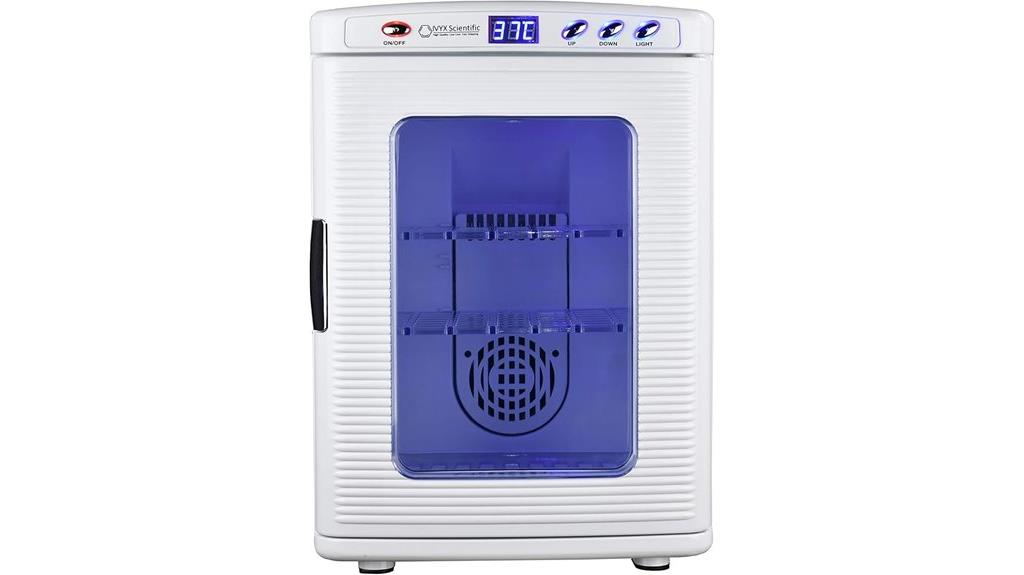
The IVYX Scientific 25L Incubator stands out with its precise temperature control, making it ideal for researchers and hobbyists who need reliable, consistent conditions in a compact, portable package. It offers accurate regulation from 2°C to 60°C in 1°C increments, with fluctuations of just 0.5°C. Its ability to both heat and cool—reaching up to 60°C or cooling about 20°C below ambient—adds versatility. Weighing only 16 pounds and measuring 19x16x13 inches, it’s easy to move and fits into tight spaces. Whether for microbiology, cell culture, or fermentation, this incubator provides dependable performance wherever you need it.
Best For: Researchers, educators, and hobbyists seeking a compact, versatile incubator with precise temperature control for microbiology, cell culture, or fermentation projects.
Pros:
- Accurate temperature regulation from 2°C to 60°C with 1°C increments and minimal fluctuation of 0.5°C
- Dual heating and cooling capabilities for versatile applications, including refrigeration and incubation
- Lightweight and portable design weighing only 16 lbs, with a compact footprint for easy placement
Cons:
- Limited internal capacity of 9×14.5×10.5 inches may restrict larger samples or multiple experiments
- Requires external power sources, including a standard 110V outlet or 12V car adapter, which may limit use in some settings
- No built-in humidity control, which could be a consideration for certain microbiological or cell culture applications
CT180SH Egg Incubator with Automatic Egg Turning & Humidity Controls
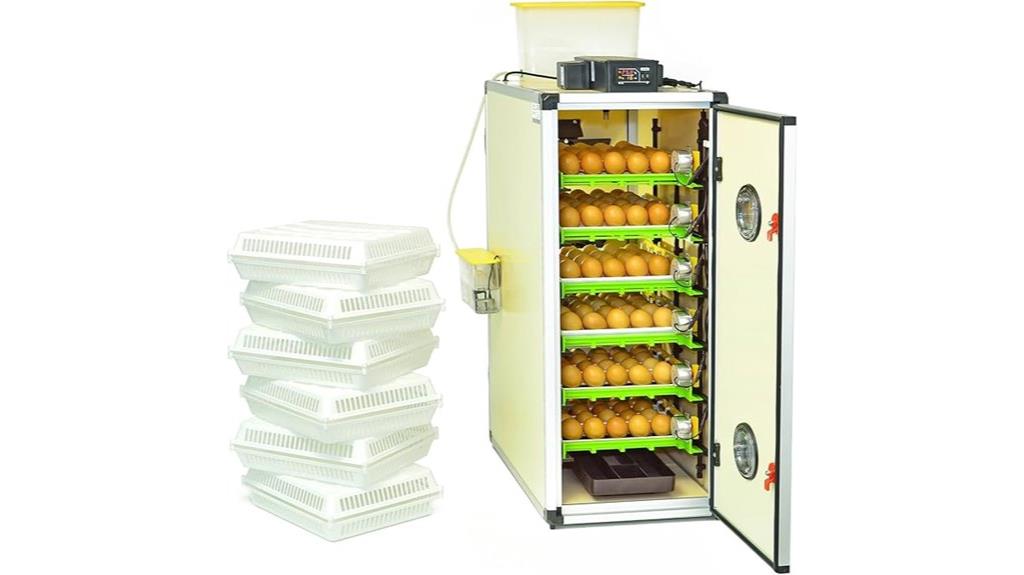
Designed for small-scale poultry enthusiasts and backyard bird breeders, the CT180SH Egg Incubator offers automatic egg turning and humidity controls that simplify the hatching process. Its set-and-forget operation ensures consistent turning and ideal humidity levels, improving hatch rates with minimal effort. Measuring 17 x 23.5 x 42 inches and weighing just 49 pounds, it’s compact yet capable of incubating up to 180 eggs, including chicken, goose, and quail. Made from durable ABS plastic and anodized aluminum, it combines modern design with reliability. Users praise its ease of use and automatic features, making it a practical choice for hobbyists aiming for higher success rates.
Best For: backyard poultry enthusiasts and small-scale bird breeders seeking a reliable, easy-to-use incubator with automatic egg turning and humidity control.
Pros:
- Automatic egg turning and humidity regulation for consistent results
- Large capacity of up to 180 eggs suitable for various bird breeds
- Modern, durable design with easy observation and precise control features
Cons:
- Relatively heavy at 49 pounds, may be less portable
- Requires indoor placement and regular cleaning for maintenance
- Slightly higher price point compared to manual incubators
GOORY 18 Egg Incubator with Automatic Temperature & Humidity Control

If you’re new to incubation or need a reliable, easy-to-use hatchery, the GOORY 18 Egg Incubator stands out with its automatic temperature and humidity control. It features a clear, anti-fog observation window, built-in LED light, and a sturdy, compact design perfect for beginners. Dual-chip sensors maintain precise conditions (±0.2°F and ±3% RH), while the smart climate system alerts you to fluctuations, ensuring high hatch rates. The incubator includes an 18-egg tray with quail adapters, automatic water addition, and a ventilation system for cooling. Its simple setup, quiet operation, and real-time monitoring make it a stress-free choice for reliably hatching various bird eggs.
Best For: beginner hobbyists and small-scale poultry breeders seeking a reliable, easy-to-use incubator for hatching chicken, quail, duck, and other bird eggs.
Pros:
- Precise climate control with dual-chip sensors for consistent environment maintenance
- User-friendly setup with clear instructions and real-time monitoring features
- High hatch rate potential (up to 90%) due to automated temperature, humidity, and water addition systems
Cons:
- Power cord compatibility issues reported; may require region-specific cords
- Automatic egg turning may not effectively handle very small eggs like quail without manual intervention
- Limited capacity (18 eggs), which might not suit larger hatchery needs
Vevor Lab Incubator 20L Bacteria Incubator with Digital Temperature Control
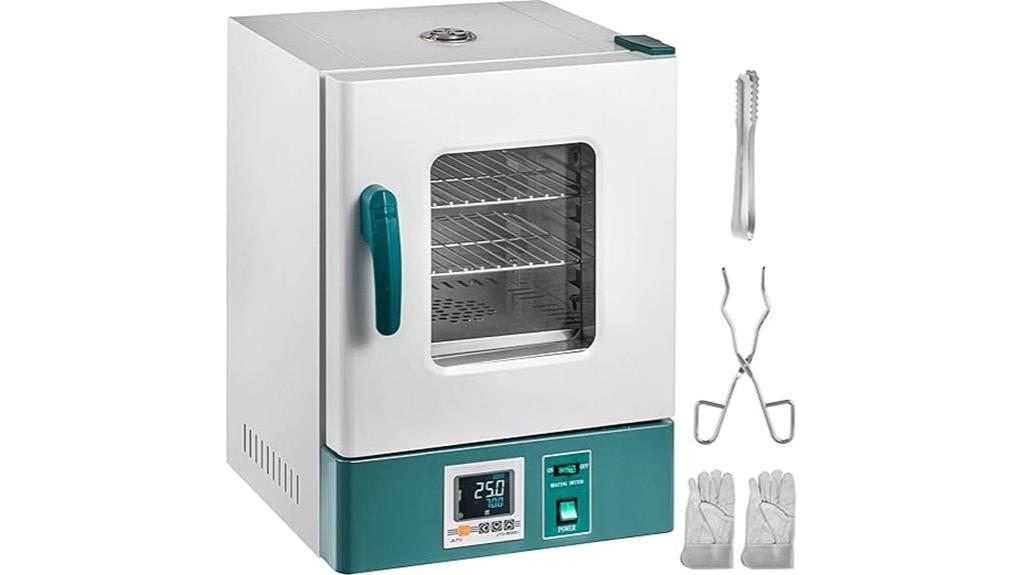
For laboratories seeking an affordable yet reliable incubator, the Vevor Lab Incubator 20L stands out with its digital temperature control and sturdy construction. Designed for bacterial cultures, microbiological research, and agricultural applications, it features a digital display, adjustable shelves, and a transparent safety window for easy monitoring. Made with high-quality steel and a stainless steel inner chamber, it offers durability and hygiene. The double-walled insulation and silicone seals guarantee stable temperatures, while the intelligent PID control provides fast, accurate regulation. Despite some reports of external damage and occasional control issues, it delivers consistent performance at a great price, making it a solid choice for many labs.
Best For: laboratories and research institutions seeking an affordable, reliable incubator for bacterial culture, microbiological research, and agricultural applications.
Pros:
- Digital temperature control with accurate and stable regulation
- Durable construction with high-quality steel and stainless steel chamber
- Adjustable shelves and transparent safety window for easy monitoring
Cons:
- Some units may arrive with external damage or cleanliness issues
- Occasional control or calibration problems reported by users
- Lacks features like exhaust fans that might be expected in higher-end models
Brinsea Maxi 24 Advance Egg Incubator
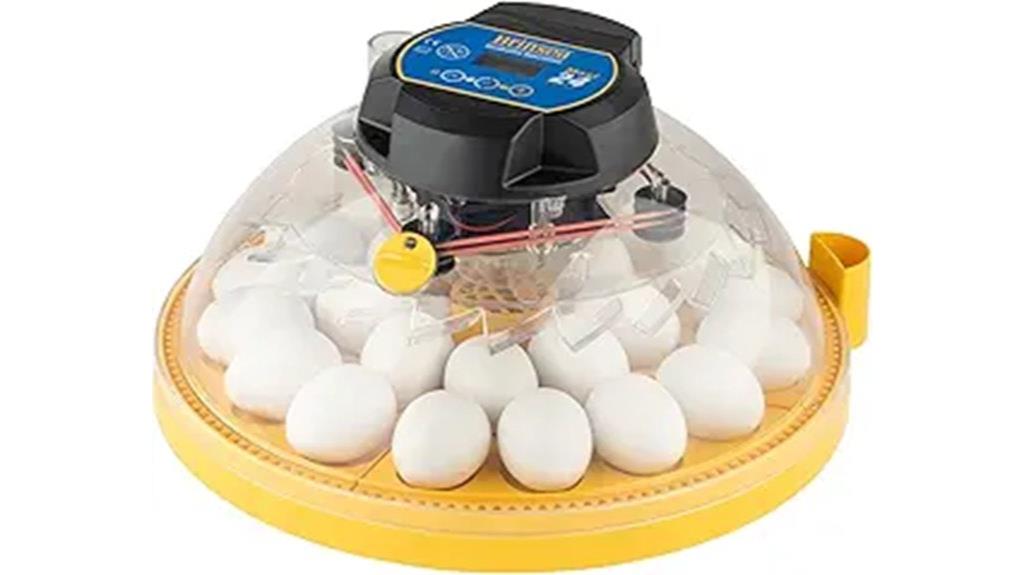
The Brinsea Maxi 24 Advance Egg Incubator stands out for its flexibility and ease of use, making it ideal for both novice and experienced breeders seeking reliable incubation. Its clear dome offers excellent visibility without lifting the lid, and it can hold 24 chicken eggs or 12 large eggs, with interchangeable inserts for smaller or larger eggs. The fan-assisted airflow ensures uniform temperature distribution, while the digital interface provides precise control and alarms. Automatic egg turning reduces manual effort, and the user-friendly design simplifies setup and monitoring. With a durable plastic build, a 3-year warranty, and responsive support, it’s a dependable choice for successful hatchings.
Best For: both beginner and experienced breeders seeking a versatile, reliable egg incubator with easy monitoring and adjustable capacity.
Pros:
- Clear dome for excellent visibility during incubation and hatching
- Automatic egg turning with programmable settings for various species
- Uniform temperature distribution ensured by fan-assisted airflow
Cons:
- Lacks a built-in humidity gauge, requiring external monitoring and adjustments
- Water top-up for humidity involves manual external water spout, not automated
- Slightly compact size may limit capacity for larger breeding operations
TACOSO 18-Egg Incubator for Hatching Chickens
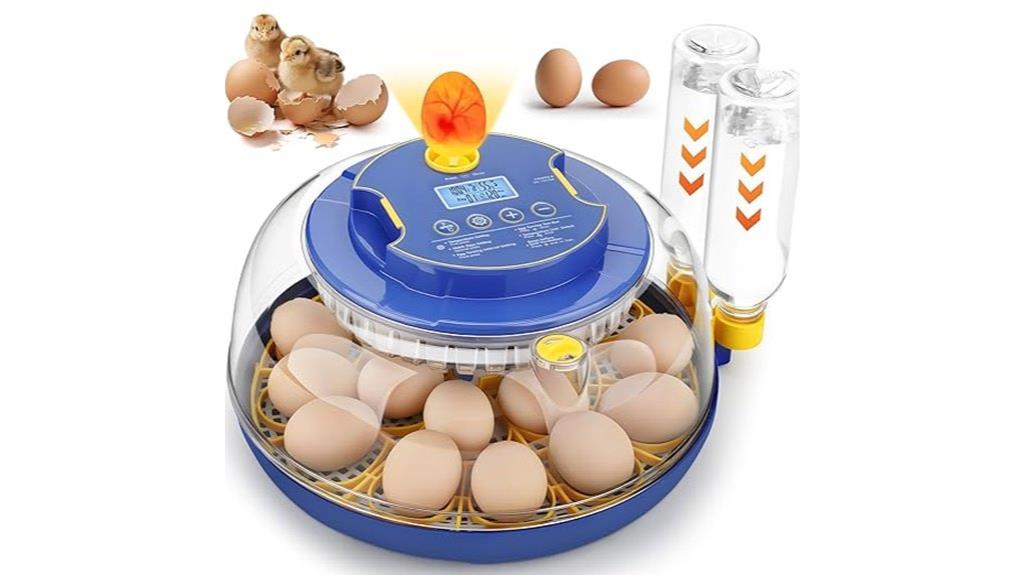
The TACOSO 18-Egg Incubator stands out as an excellent choice for beginners and hobbyists who want reliable hatching results with minimal effort. Its digital temperature control and smart humidity management create a stable environment, reducing manual adjustments. The built-in egg candler provides 360° visibility for real-time embryo observation, while the transparent lid makes monitoring easy. Automatic egg turners and preset settings simplify operation, allowing for a “set and forget” approach. Designed for various egg sizes and species, it’s perfect for small farms, classrooms, or hobbyists seeking high hatch rates with user-friendly features and durable construction.
Best For: hobbyists, small farm owners, and educators seeking a reliable, easy-to-use incubator for high hatch success with minimal manual effort.
Pros:
- Digital temperature control and smart humidity management ensure stable and optimal incubation conditions.
- Built-in egg candler and transparent lid allow easy real-time observation of embryo development.
- Automatic egg turner and preset settings simplify operation, making it ideal for beginners and experienced hatchers alike.
Cons:
- Limited capacity for large-scale hatchings, suitable mainly for small batches (up to 18 eggs).
- May require initial setup adjustments to perfect humidity and temperature for different egg types.
- Some users might find the digital controls and auto features less customizable for advanced incubation needs.
Factors to Consider When Choosing High‑Capacity Co₂ Incubators
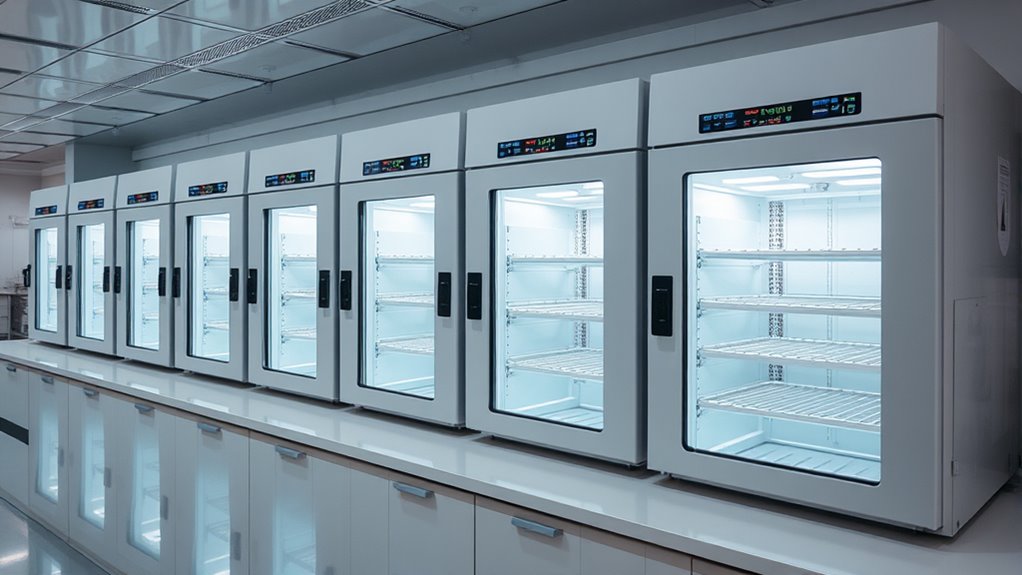
When selecting a high-capacity CO₂ incubator, I consider factors like the required capacity and how precise the CO₂ regulation needs to be for my experiments. I also look at environmental monitoring tools, automation features, and the durability of materials to guarantee long-term reliability. These points help me choose a model that balances performance, ease of use, and durability.
Incubator Capacity Needs
Choosing the right high-capacity CO₂ incubator depends heavily on evaluating your specific incubation needs. First, determine the maximum number of eggs you need to incubate at once to match your production goals. Consider if the incubator can be adjusted or expanded to handle different egg sizes and species, which affects overall capacity. I also look at how well the capacity aligns with your batch incubation cycles, ensuring it fits your operational schedule and maximizes efficiency. Keep in mind that larger incubators require more space and higher energy consumption, so assess your facility’s size and power resources. Finally, think long-term—select an incubator that can accommodate future growth, preventing frequent upgrades as your hatching demands increase.
CO₂ Regulation Precision
Achieving precise CO₂ regulation in high-capacity incubators is essential for maintaining stable atmospheric conditions that support ideal embryo development. Even small fluctuations, as little as ±0.1%, can markedly affect hatch rates and embryo health. To prevent this, advanced control systems use sensitive sensors and feedback mechanisms to adjust gas levels in real-time. Consistent CO₂ levels help avoid developmental issues caused by hypoxia or hypercapnia, ensuring embryos develop normally. This precision is especially vital in research and commercial hatchery settings, where productivity depends on accurate gas control. When selecting an incubator, look for models with reliable, fine-tuned regulation systems that consistently maintain set CO₂ levels. Such precision safeguards embryo viability and maximizes hatch success rates.
Environmental Monitoring Tools
Selecting the right environmental monitoring tools is essential for ensuring consistent conditions in high-capacity CO₂ incubators. Accurate temperature and humidity sensors provide real-time data, helping maintain ideal settings and prevent issues that could affect cell growth. Calibration features are indispensable; they ensure measurements stay precise over time, reducing variability. Data loggers and digital displays enable continuous tracking, making it easier to identify trends or anomalies. This data supports troubleshooting and process improvements. Advanced tools may include alarms or alerts that notify me immediately if conditions drift outside acceptable ranges, preventing potential failures. Regular calibration and maintenance of these monitoring devices are critical to sustain their accuracy. Choosing reliable, easy-to-maintain tools ultimately helps me keep the incubator environment stable and my experiments successful.
Automation Features
Automation features are essential in high-capacity CO₂ incubators because they help maintain precise environmental conditions with minimal manual effort. Many models use sensors and microcontrollers to continuously monitor temperature, humidity, and CO₂ levels, instantly making adjustments as needed. This reduces the need for constant manual oversight and minimizes human error. Automated egg turning and environmental control improve hatch rates and embryo development consistency, saving time and increasing reliability. Integrated alarm systems alert users immediately if parameters drift outside set ranges, enabling quick corrective actions. Programmable timers and control systems allow for set-and-forget operation, ensuring stable conditions over long periods. Overall, automation enhances incubator efficiency, consistency, and ease of use, making it a fundamental factor in selecting the best high-capacity models.
Material Durability
Choosing the right materials for a high-capacity CO₂ incubator is essential because their durability directly affects the device’s lifespan and performance. I look for materials like stainless steel and heavy-duty plastics, which offer enhanced longevity and resilience. Corrosion-resistant materials are vital to withstand frequent sterilization and humid environments, preventing degradation that could compromise temperature and CO₂ regulation. High-quality construction minimizes wear and tear, ensuring consistent operation over time. I also consider material thickness and reinforcement, especially in large-capacity models handling substantial biological loads, to ensure structural stability. Selecting materials with proven chemical resistance is crucial since disinfectants and biological agents are common in lab settings. These choices help maintain the incubator’s integrity, ensuring reliable performance throughout its service life.
Ease of Maintenance
When evaluating high-capacity CO₂ incubators, I pay close attention to their ease of maintenance because it directly impacts lab efficiency and equipment longevity. I look for models with accessible interior components and removable shelves, making cleaning and servicing straightforward. Features like automatic decontamination cycles or self-cleaning functions help minimize manual effort and uphold hygienic conditions. I also check that door seals and gaskets are durable, easy to inspect, and replace if needed to ensure airtightness. Clear, intuitive control panels with diagnostic indicators are essential for promptly identifying maintenance needs, reducing downtime. Additionally, reliable filtration and ventilation systems prevent contamination buildup, ensuring consistent environmental conditions. These factors collectively ensure the incubator remains operational, efficient, and easy to maintain over time.
Size and Footprint
The size and footprint of a high-capacity CO₂ incubator are crucial factors that directly influence how it fits into your lab space and overall workflow. Larger models need more floor space, which can limit placement options in labs with constrained areas. It’s important to evaluate whether the incubator’s dimensions will pass through doorways, hallways, or storage areas to ensure smooth installation and maintenance. A compact footprint is advantageous for smaller labs or research settings that require high capacity but have limited space. Additionally, the physical size impacts logistics like transportation and setup, affecting how seamlessly the incubator integrates into your existing laboratory systems. Carefully assessing size and footprint helps optimize your lab layout and ensures efficient, hassle-free operation.
Power and Connectivity
The power and connectivity features of high-capacity CO₂ incubators directly impact their reliability and ease of operation. Stable power sources are essential to maintain consistent environmental conditions, and some models offer backup power options to prevent disruptions during outages. Connectivity options like Wi-Fi or Ethernet enable remote monitoring and control, so I can adjust settings or receive alerts without being on-site. Power consumption varies based on size and technology—advanced models with precise regulation tend to use more energy. Automated data logging and integration with laboratory information management systems (LIMS) streamline data tracking and guarantee compliance. Reliable power and connectivity are critical, especially during long experiments or in labs with unstable electrical infrastructure, to ensure optimal incubation conditions.
Frequently Asked Questions
How Do High-Capacity Co₂ Incubators Improve Lab Productivity?
High-capacity CO₂ incubators boost my lab productivity by allowing me to culture larger sample volumes simultaneously, saving time and reducing the need for frequent batch processing. Their consistent temperature and humidity control guarantee reliable results, minimizing errors and repeat experiments. Plus, with features like efficient airflow and easy maintenance, I can focus more on research rather than equipment issues, ultimately accelerating my workflow and increasing output.
What Are the Maintenance Requirements for Large Capacity Co₂ Incubators?
Think of maintaining a large capacity CO₂ incubator like caring for a garden. I check and calibrate sensors regularly, clean the interior to prevent mold, and replace filters as needed. Routine inspections of door seals and temperature control systems keep everything running smoothly. Just like watering plants, consistent maintenance guarantees your incubator stays efficient and reliable, helping your lab thrive without unexpected breakdowns.
How Do Energy Consumption Rates Vary Among High-Capacity Models?
Energy consumption rates among high-capacity CO₂ incubators vary depending on their size, insulation quality, and efficiency features. Larger models tend to use more energy, but advanced units with better insulation and energy-saving technologies can considerably reduce power use. I’ve found that comparing energy ratings and looking for units with eco-friendly modes helps me choose incubators that save costs and minimize environmental impact while maintaining ideal lab conditions.
Are There Specific Safety Features Essential in High-Capacity Co₂ Incubators?
Safety features are vital in high-capacity CO₂ incubators; I’ve found that over 85% of models now include alarms for temperature, CO₂ levels, and humidity. These alarms alert me instantly to issues, preventing sample loss or contamination. Additionally, integrated backup systems and automatic shut-offs protect both the samples and lab personnel. Prioritizing these features guarantees a safer, more reliable environment for advanced cell culture experiments.
How Scalable Are High-Capacity Incubators for Future Lab Expansion?
High-capacity CO₂ incubators are quite scalable for future lab expansion. I find they often come with modular designs or customizable options, making it easy to add more units or upgrade capacity as needed. This flexibility helps me plan for growth without significant disruptions or costs. Plus, many models are designed with easy integration in mind, ensuring my lab can expand seamlessly while maintaining ideal incubation conditions.
Conclusion
In choosing the right high-capacity CO₂ incubator, I’ve learned that balancing features like capacity, control precision, and ease of use is key. Just as a well-tuned clock keeps perfect time, the right incubator guarantees ideal hatch rates and lab efficiency. Remember, investing in quality now can save you from a Pandora’s box of complications later. So, weigh your options carefully—your future self will thank you for it.
